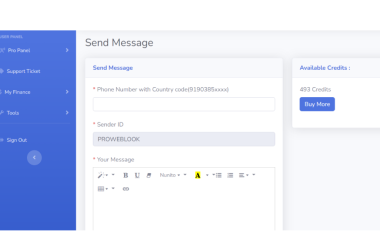Introduction.
IP Lookup Tool: In today’s digital age, where the internet serves as the backbone of communication, commerce, and information exchange, understanding the mechanisms that govern its functioning is essential. Among these mechanisms, IP (Internet Protocol) lookup stands out as a fundamental tool for identifying and understanding the flow of data across networks.
The Foundation of IP Lookup Tool.
At the heart of IP lookup lies the concept of IP addresses. An IP address serves as a unique identifier for devices connected to a network, enabling them to send and receive data packets. Similar to how a postal address directs mail to its destination, an IP address directs digital data to its intended recipient.
The most widely used version of the Internet Protocol is IPv4, which utilizes a 32-bit address space, allowing for approximately 4.3 billion unique addresses. IPv6 employs a 128-bit address space, providing an astronomical number of possible addresses to accommodate the expanding internet ecosystem.
The Evolution of IP Lookup Tool.
IP lookup origins trace to early internet days for mapping IP addresses to locations, initially through databases and reverse DNS.
As the internet grew in complexity and scale, the demand for more sophisticated IP lookup solutions arose. This led to the development of dedicated geolocation databases and algorithms designed to accurately map IP addresses to physical locations. T
Technical Underpinnings of IP Lookup.
IP lookup involves technical components and methodologies enhancing accuracy and reliability of geolocation data acquisition. Some of the key technical underpinnings of IP lookup include:
1. Database Mapping: IP geolocation databases store mapping information that links IP addresses to geographic locations. These databases utilize a combination of static data (such as registry information) and dynamic data to maintain accurate mappings.
2. Anycast Detection: Anycast is a network addressing and routing technique that allows multiple servers to share the same IP address. Detecting and distinguishing between different instances of an anycasted IP address is crucial for accurate geolocation.
3. BGP Analysis: Border Gateway Protocol (BGP) routing tables provide insights into the paths that data packets traverse across the internet. Analyzing BGP routing information can help refine geolocation data by identifying the geographic locations of network nodes and transit points.
4. Machine Learning Algorithms: Advanced machine learning algorithms are increasingly being employed to improve the accuracy of IP geolocation. These algorithms analyze patterns and correlations in geolocation data to make precise predictions about the location of IP addresses.
Practical Applications of IP Lookup Tool.
The utility of IP lookup extends across a diverse range of applications and industries, each leveraging geolocation data to achieve specific objectives. Some of the most prominent practical applications of IP lookup include:
1. Geo Targeted Advertising: Businesses utilize IP geolocation data to deliver targeted advertisements to users based on their geographic location. By tailoring ad content to local preferences and interests, advertisers can enhance engagement and conversion rates.
2. Content Localization: Content providers use IP geolocation to deliver region-specific content and services to users. This includes localized versions of websites, apps, and multimedia content tailored to the cultural and linguistic preferences of different regions.
3. Fraud Detection and Prevention: E-commerce platforms and financial institutions employ IP geolocation data to detect and prevent fraudulent activities such as account hijacking, identity theft, and payment fraud. By analyzing the geographic patterns of suspicious transactions, fraud detection systems can flag potentially fraudulent behavior for further investigation.
4. Network Security: Cybersecurity professionals rely on IP geolocation to identify and mitigate security threats such as malware infections, phishing attacks, and network intrusions. By correlating IP addresses with known threat indicators and suspicious behavior patterns, security analysts can proactively defend against cyber threats.
5. Network Optimization: Network administrators use IP geolocation data to optimize the routing and performance of network traffic.
Challenges and Limitations.
Despite its many benefits, IP lookup is not without its challenges and limitations. Some of the key challenges associated with IP geolocation include:
1. Accuracy and Precision: While modern IP geolocation databases strive for high accuracy, factors such as dynamic IP assignments, proxy servers, and mobile device usage can introduce inaccuracies and uncertainties into the geolocation process.
2. Privacy Concerns: The collection and use of IP geolocation data raise significant privacy concerns, particularly regarding user consent, data retention, and potential misuse.
3. IPv6 Adoption: The transition from IPv4 to IPv6 presents unique challenges for IP geolocation, as IPv6 addresses are longer and less structured than their IPv4 counterparts.
4. Regulatory Compliance: Compliance with regional privacy regulations such as the General Data Protection Regulation (GDPR) and the California Consumer Privacy Act (CCPA) poses additional challenges for IP geolocation providers. Ensuring compliance with data protection laws while delivering geolocation-based services requires careful attention to legal and ethical considerations.
Future Trends and Innovations.
Looking ahead, several emerging trends and innovations are poised to shape the future of IP lookup and geolocation technology. These include:
1. 5G and IoT Integration: The rollout of 5G networks and the proliferation of Internet of Things (IoT) devices will generate vast amounts of geolocatable data, driving demand for real-time, high-precision IP geolocation solutions capable of supporting diverse use cases across industries.
2. Edge Computing: Edge computing architectures, which distribute processing tasks closer to the point of data generation, will enable more efficient and scalable IP geolocation solutions by reducing latency and bandwidth requirements for geolocation queries.
3. Blockchain Integration: Blockchain technology offers opportunities to enhance the security and transparency of IP geolocation data by providing immutable, decentralized ledgers for recording and verifying location information.
4. Augmented Reality (AR) and Location-Based Services (LBS): The convergence of AR and LBS technologies will create new opportunities for immersive, location-aware experiences, driving demand for highly accurate and responsive IP geolocation solutions.
5. Ethical Geolocation Practices: As awareness of privacy and data protection issues grows, there will be increasing emphasis on ethical geolocation practices, and data minimization principles.
Conclusion.
In conclusion, IP lookup tool plays a vital role in the functioning of the internet ecosystem, enabling businesses, organizations, and individuals to leverage geolocation data for a wide range of applications. From targeted advertising and content localization to fraud detection and network security,
Kindly check our website Proweblook for more Web API tools. More resources can be found on our Github page. Social Channels are Twitter, Facebook & Youtube.








